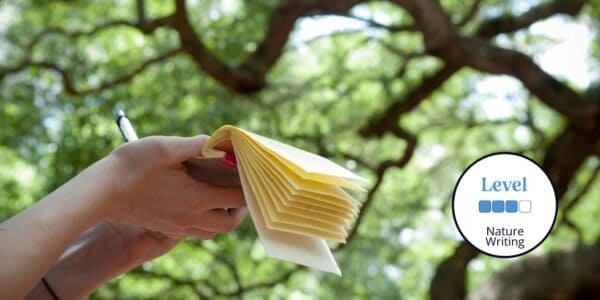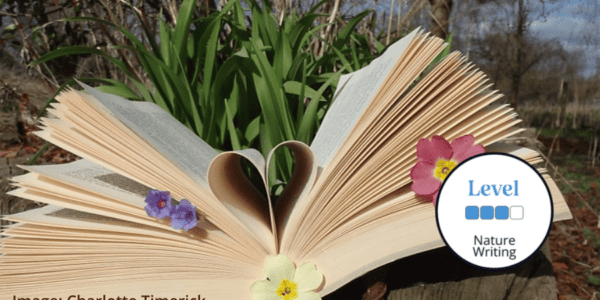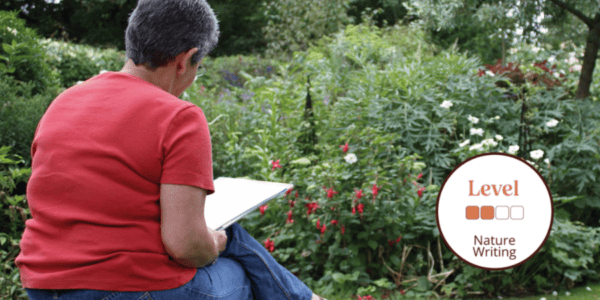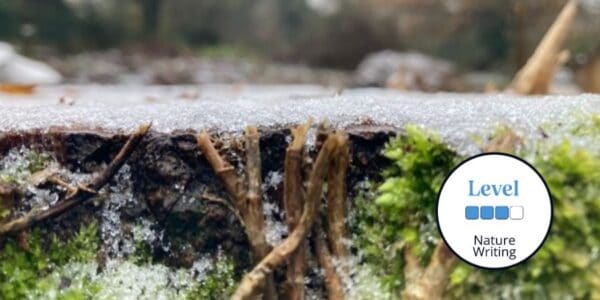This intermediate course will introduce you to writing nature memoir. Using the grounds of Preston Montford as inspiration for a short piece of nature writing, you will develop skills in crafting, editing and reflection.
The course will allow you to connect with fellow nature writers, learn how to apply a story arc to a vignette, and develop skills in giving constructive feedback to other writers.
This course will include:
- How to apply a story arc to a piece of nature writing.
- How to edit on three levels – paragraph, sentence, word.
- How to give constructive feedback to other writers.
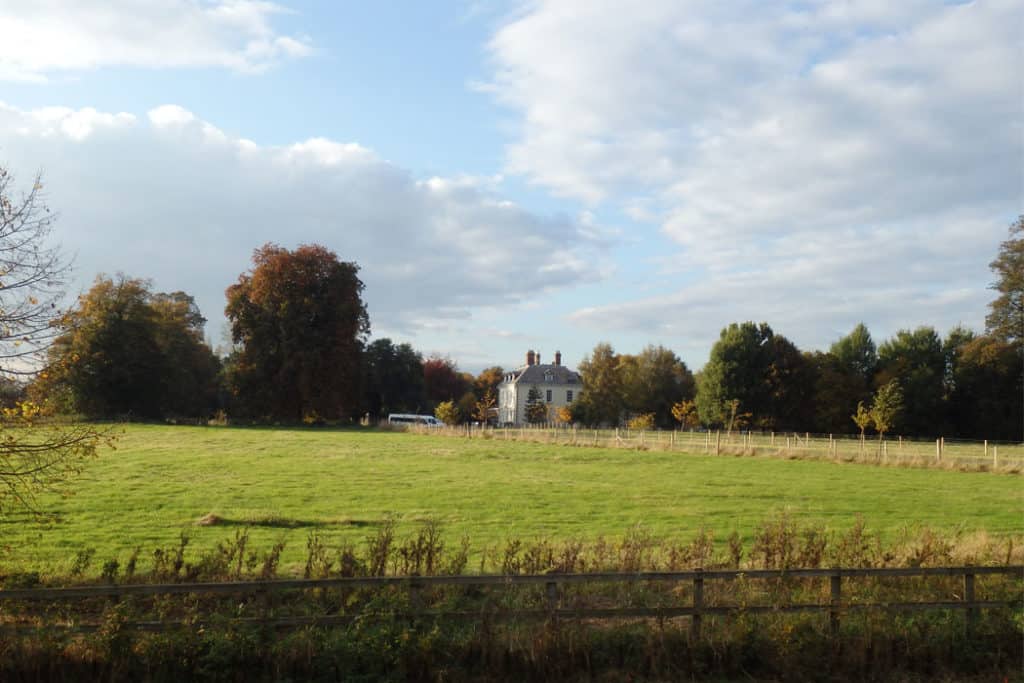
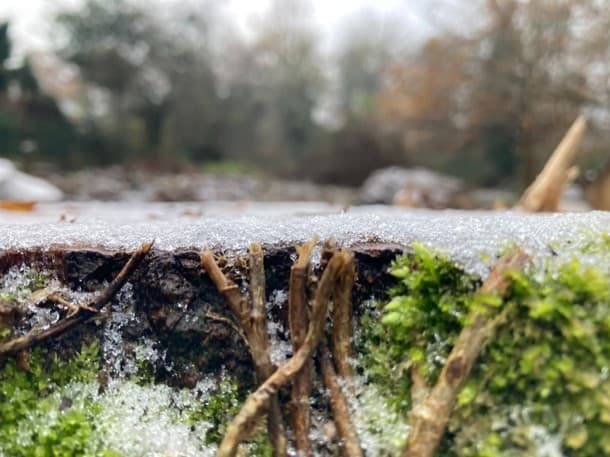

Read More
This course will cover: memoir, literary techniques, narrative voice, setting the scene, introducing character, using a story arc, crafting, editing, reflection and feedback. We will explore the grounds at the field centre, identifying and researching species/habitats and undertake various creative writing tasks.
During this course course, you will:
- Explore writer’s methods and apply a story arc to a vignette.
- Use the grounds of Preston Montford as inspiration for a piece of nature memoir.
- Develop skills in crafting, editing, reflection and giving constructive feedback.
Who Should Attend: Anyone with an interest in writing about their experiences in nature. You might be a budding writer, or someone who wants to write nature blogs about their garden or rewilding project, or someone who just wants to write for their own enjoyment.
Knowledge Level – Intermediate. Level descriptors can be found on the following web-page: Framework and Course Level Descriptors.
Prior Knowledge – No existing knowledge or experience is needed for this course, just a willingness to explore and learn.
PLEASE NOTE: There is no accommodation or meal facilities provided with this course. Refreshments (tea and coffee) will be available. If we are unable to reach viable numbers for this course, we will inform you of the course cancellation 4-5 weeks prior to the course run. We would recommend when purchasing accommodation and/or travel you should take out your own insurance.
Bookings will close if course capacity is reached.
Please email [email protected] if you have any questions.
About the Tutor
Carolyn Drever
Carolyn Drever is a writer and a teacher with a special interest in English and Outdoor Learning. She began teaching creative writing 30 years ago, has taught in universities and schools, and worked on projects with the Field Studies Council, the Wildlife Trusts and EU Erasmus+.
Example Timetable
10:00 – 10:45: Writer’s voice (classroom)
10:45: break
11:00 – 11:45: Setting the scene (outdoor guided walk)
11:45 – 12:30: Species/habitat research, photography, free-writing (independent outdoor)
12:30 – 1:00: Crafting, reflection and feedback (classroom)
Lunch: 1:00 – 1:45
1:45 – 2:00: Applying a story arc (classroom)
2:00 – 3:15: Introducing character, species/habitat research, photography, free-writing and crafting (independent outdoor)
3:15 – 4:00: Crafting, editing, reflection (classroom)
4:00 – 5:00: Sharing stories, constructive feedback, reflection (classroom)
Please note: this is an example timetable and may change depending on the weather and the group.
Lunch is not included so please bring your own food. Refreshments (tea and coffee) will be provided.
What's Included
The course has been carefully created by expert tutors and educators to help you build your knowledge and apply it within the field surrounded by like-minded individuals.
The course includes:
- Classroom learning covering the theory of the topic
- Field excursions to apply new knowledge
- Expert tuition for which the Field Studies Council is renowned
- Clear objectives and progression
- Refreshments (tea/coffee)
You can rest assured that the absolute best content from an expert in environmental education will be provided. In choosing a Field Studies Council course, you will be joining thousands of people who learn with us each year.
Bursaries and Subsidies
Student Discount
This course is eligible for a student discount. If you are a current student, please use discount code BioStudent20 at checkout for 20% off all Biodiversity courses.
Before You Attend
What to Bring
- Notebook and pencil, or your preferred writing materials
- Lunch and refreshments
- Sensible footwear and clothing for being outdoors
- Small bag to carry personal items
- Cameras/phones for species/habitat images
- Tablets/phones for research/writing
- You may wish to bring a hand lens and field guides
There will be a member of staff with first aid training and access to a first aid kit on site. If you have special medical or access requirements, please let us know as soon as possible so we can plan the course.
Opportunities to attend this course
Progress Your Learning
This is a training course from the Field Studies Council, delivered by expert tutors with an approachable learning style. After attending this course, you may like to progress your learning with further relevant courses or branch out into other areas of natural history. The Field Studies Council offers both online and in person courses, so you can choose the learning style that suits you best.
The course gives you the opportunity to immerse yourself in a new subject and acquire novel skills. Our online portal gives you time to study at your own pace and fit the lessons around your own schedule.
If you have any questions about our courses, please check out our Frequently Asked Questions or email [email protected].
Group Bookings Made Easy
If you have a group of 10 or more individuals wanting to complete one of our courses, our team are available to discuss your options – from discounts to private team courses. Find out more!
You can rest assured that the absolute best content from an expert in environmental education will be at your fingertips. In choosing a Field Studies Council course, you will be joining thousands of people who learn with us each year.


